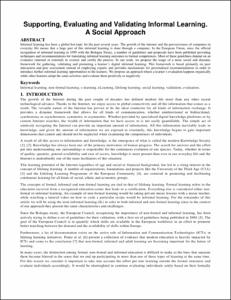Mostra el registre d'ítem simple
Supporting, evaluating and validating informal learning: A social approach
| dc.contributor.author | Galanis, Nikolaos |
| dc.contributor.author | Mayol Sarroca, Enric |
| dc.contributor.author | Alier Forment, Marc |
| dc.contributor.author | García Peñalvo, Francisco Javier |
| dc.contributor.other | Universitat Politècnica de Catalunya. Institut de Ciències de l'Educació |
| dc.date.accessioned | 2016-04-08T11:39:23Z |
| dc.date.available | 2018-02-28T01:30:21Z |
| dc.date.issued | 2016-02 |
| dc.identifier.citation | Galanis, N., Mayol, E., Alier, M., García, F.J. Supporting, evaluating and validating informal learning: A social approach. "Computers in human behavior", Febrer 2016, vol. 55, Part A, p. 596-603. |
| dc.identifier.issn | 0747-5632 |
| dc.identifier.uri | http://hdl.handle.net/2117/85423 |
| dc.description | © 2015. This manuscript version is made available under the CC-BY-NC-ND 4.0 license http://creativecommons.org/licenses/by-nc-nd/4.0/ |
| dc.description.abstract | Informal learning has been a global hot topic for the past several years. The growth of the internet and the pervasiveness of computers in everyday life means that a huge part of this informal learning is done through a computer. In the European Union, since the official recognition of informal learning in 1999 with the Bologna Treaty, a number of guidelines and proposals have been published providing techniques and recommendations for translating informal learning outcomes to formal competences. Most of these guidelines depend on an evaluator (internal or external) to oversee and certify the process. In our work, we propose the usage of a more social and dynamic framework for gathering, validating and promoting a learner's digital informal learning. This framework is based primarily on peer interaction and peer assessment instead of employing experts and provides mechanisms for personalized recommendations in order to introduce further informal learning opportunities to the learners. We propose an approach where a learner's evaluation happens organically while other learners adopt the same activities and evaluate them positively or negatively. |
| dc.format.extent | 8 p. |
| dc.language.iso | eng |
| dc.rights.uri | http://creativecommons.org/licenses/by-nc-nd/3.0/es/ |
| dc.subject | Àrees temàtiques de la UPC::Ensenyament i aprenentatge::TIC's aplicades a l'educació::Ensenyament virtual (eLearning) |
| dc.subject.lcsh | Continuing education |
| dc.subject.lcsh | Internet in education |
| dc.subject.lcsh | Non-formal education |
| dc.subject.other | Informal learning |
| dc.subject.other | Non-formal learning |
| dc.subject.other | E-learning |
| dc.subject.other | Lifelong learning |
| dc.subject.other | Social learning |
| dc.subject.other | Validation |
| dc.subject.other | Evaluation |
| dc.title | Supporting, evaluating and validating informal learning: A social approach |
| dc.type | Article |
| dc.subject.lemac | Educació permanent |
| dc.subject.lemac | Internet en l'ensenyament |
| dc.subject.lemac | Educació no-formal |
| dc.contributor.group | Universitat Politècnica de Catalunya. SUSHITOS - Grup de recerca en serveis per a tecnologies d'informació socials, ubiqües i humanístiques, i per a software lliure |
| dc.identifier.doi | 10.1016/j.chb.2015.08.005 |
| dc.description.peerreviewed | Peer Reviewed |
| dc.relation.publisherversion | http://www.sciencedirect.com/science/article/pii/S0747563215300832 |
| dc.rights.access | Open Access |
| local.identifier.drac | 17241320 |
| dc.description.version | Postprint (author's final draft) |
| dc.relation.projectid | info:eu-repo/grantAgreement/CE/Lifelong Learning Programme/519141-LLP-1-2011-1-ES-KA3-KA3MP |
| local.citation.author | Galanis, N.; Mayol, E.; Alier, M.; García, F.J. |
| local.citation.publicationName | Computers in human behavior |
| local.citation.volume | 55, Part A |
| local.citation.startingPage | 596 |
| local.citation.endingPage | 603 |
Fitxers d'aquest items
Aquest ítem apareix a les col·leccions següents
-
Articles de revista [73]
-
Articles de revista [56]


